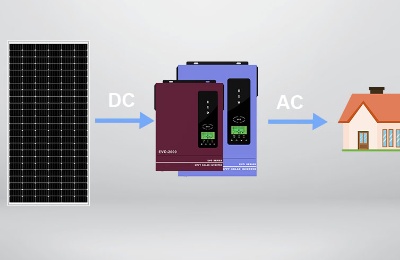ما هو العاكس الأفضل، الهجين أم المستقل عن الشبكة؟
Aug 26, 2025
عند اختيار نظام الطاقة الشمسية، يُعد اختيار العاكس المناسب أحد أهم القرارات. يلعب العاكس دورًا أساسيًا في كفاءة تحويل نظامك للطاقة الشمسية إلى كهرباء قابلة للاستخدام، وله تأثير مباشر على الأداء العام، بالإضافة إلى توفير التكاليف على المدى الطويل. من بين الخيارات العديدة المتاحة، يُعدّ العاكس الهجين والعاكس المستقل عن الشبكة من أكثر الخيارات شيوعًا. على الرغم من أن كليهما يُشكّلان جوهر نظام الطاقة الشمسية، إلا أن تصميمهما ووظائفهما وأفضل استخداماتهما تختلف اختلافًا كبيرًا.فهم العاكسات خارج الشبكةعاكس الطاقة المستقل عن الشبكة مصمم خصيصًا لأنظمة الطاقة الشمسية غير المتصلة بشبكة الكهرباء العامة. يحوّل هذا العاكس التيار المستمر (DC) من الألواح الشمسية أو بطاريات التخزين إلى تيار متردد (AC) لتشغيل الأجهزة الكهربائية. تُعد هذه العاكسات ضرورية في المناطق النائية التي يصعب فيها الوصول إلى الشبكة أو يصعب الاعتماد عليها. وفقًا لتقرير صادر عن الوكالة الدولية للطاقة المتجددة (IRENA)، لا يزال أكثر من 770 مليون شخص حول العالم يفتقرون إلى إمكانية الحصول على الكهرباء بشكل موثوق، مما يجعل الطاقة خارج الشبكة مصدرًا حيويًا للطاقة. عاكس الطاقة الشمسية الهجين خارج الشبكةيوفر نظام الطاقة الشمسية الكهروضوئية، الذي يمكنه الجمع بين الطاقة الشمسية والمولدات والبطاريات، المرونة للمجتمعات والشركات التي لا يمكنها الاعتماد على كهرباء الشبكة. الميزة الرئيسية لعاكس الطاقة المستقل عن الشبكة هي الاستقلالية. فهو يضمن تلبية احتياجات الطاقة بالكامل من خلال الطاقة المتجددة وسعة البطارية المُخزّنة. إلا أن عيبه يكمن في محدودية مرونته: فبمجرد نفاد طاقة البطارية وانقطاع ضوء الشمس، قد ينقطع التيار الكهربائي ما لم يُدعم بمولد احتياطي. فهم العاكسات الهجينةتجمع المحولات الهجينة، التي تُعرف أحيانًا بالمحولات المتصلة بالشبكة مع بطارية احتياطية، بين مزايا أنظمة الطاقة المتصلة بالشبكة وخارجها. فهي قادرة على تخزين الطاقة الزائدة في البطاريات، وإعادة تغذية الشبكة بها. وقد زادت هذه الوظيفة المزدوجة من شعبية المحولات الهجينة في المناطق ذات الشبكات غير المستقرة وارتفاع تكاليف الكهرباء. أشار تقرير صادر عن بلومبرغ إن إي إف عام ٢٠٢٣ إلى أن العاكسات الهجينة تشهد نموًا بمعدل نمو سنوي مركب يتجاوز ١٢٪، مدفوعًا بالطلب على استقلالية الطاقة والإدارة الذكية للطاقة. تتيح التصاميم الحديثة، مثل العاكس الشمسي الهجين الذكي، التبديل التلقائي السلس بين الطاقة الشمسية والشبكة والبطارية، مما يقلل من وقت التوقف وفقدان الطاقة. بالإضافة إلى ذلك، تتميز النماذج المتقدمة الآن بما يلي: عاكس الطاقة الشمسية الهجين متعدد MPPT تقنية MPPT (تتبع أقصى نقطة طاقة) تُحسّن حصاد الطاقة من الألواح الشمسية، خاصةً في التركيبات التي تواجه فيها الألواح اتجاهات أو ظروف تظليل مختلفة. يمكن للأنظمة المزودة بأجهزة تتبع MPPT متعددة تحقيق كفاءة طاقة أعلى بنسبة 10-15% مقارنةً بعاكسات MPPT أحادية. مقارنة الأداءيوفر كلٌّ من العاكسات الهجينة وغير المتصلة بالشبكة تحويلًا موثوقًا للطاقة، إلا أن كفاءتها وقابليتها للتكيف تختلفان باختلاف الاستخدام. تُعد الأنظمة الهجينة أكثر كفاءةً عمومًا لأنها تتيح مصادر متعددة للطاقة، بينما صُممت الأنظمة غير المتصلة بالشبكة لتكون مستقلةً تمامًا. فيما يلي مقارنة جنبًا إلى جنب استنادًا إلى الاعتبارات التقنية والعملية الرئيسية: ميزةعاكس خارج الشبكةعاكس هجيناتصال الشبكةغير متصل بالشبكةيمكن الاتصال والتصدير إلى الشبكةمتطلبات البطاريةإلزامياختياري (ولكن موصى به)نطاق الكفاءة85-93%92-98%المرونةيقتصر على الطاقة الشمسية والبطاريةتكامل الطاقة الشمسية والبطاريات والشبكةأفضل حالة استخدامالمناطق النائية التي لا تتوفر فيها إمكانية الوصول إلى الشبكةالمنازل/الشركات التي لديها شبكة كهرباء ولكن إمدادها غير مستقرالطاقة الاحتياطيةالبطاريات و/أو المولداتالبطاريات والطاقة الشمسية والنسخ الاحتياطي للشبكةإدارة الطاقة الذكيةنادرا ما يتم تضمينهمتوفر في نماذج مثل العاكس الشمسي الهجين الذكيتكلفة النظامانخفاض التكلفة الأوليةإمكانية تحقيق وفورات أكبر مقدمًا وعلى المدى الطويل أيهما الأفضل بالنسبة لك؟يعتمد الاختيار بين الطاقة الهجينة وخارج الشبكة على احتياجاتك المحددة من الطاقة: إذا كنت تعيش في منطقة نائية لا تتوفر فيها شبكة كهرباء، فسيكون العاكس الشمسي المستقل عن الشبكة هو الحل الأمثل. فهو يضمن استقلالية تامة في استهلاك الطاقة، مع أنك ستحتاج إلى شراء مجموعة بطاريات متينة. كما يمكنك التفكير في استخدام عاكس شمسي هجين مستقل عن الشبكة إذا كنت ترغب في مرونة إضافية في استخدام المولد. إذا كنت في منطقة حضرية أو ضاحية متصلة بالشبكة الكهربائية ولكنك ترغب في مقاومة الانقطاعات، فإن العاكس الهجين هو الأنسب. إن القدرة على إعادة تغذية الشبكة بالطاقة، بالإضافة إلى ميزات ذكية مثل إدارة الأحمال والمراقبة الآنية، تجعل خيارات مثل عاكس الطاقة الشمسية الهجين الذكي أو محول الطاقة الشمسية الهجين متعدد MPPT يعد استثمارًا ممتازًا للأمن الطاقي على المدى الطويل. بالنسبة للتركيبات التجارية، غالبًا ما تُحقق العاكسات الهجينة عائدًا استثماريًا أفضل. بتقليل الاعتماد على كهرباء الشبكة وبيع فائض الطاقة لشركات المرافق، يُمكن للشركات خفض تكاليف التشغيل بشكل ملحوظ. مستقبل العاكسات الشمسيةمع تزايد الطلب على الطاقة وتقدم تكنولوجيا الطاقة المتجددة، أصبحت العاكسات الهجينة الخيار السائد عالميًا. وتتوقع دراسة أجرتها شركة وود ماكنزي أن تمثل العاكسات الهجينة أكثر من 60% من إجمالي مبيعات العاكسات المنزلية بحلول عام 2030. فمرونتها، وتكاملها مع تخزين البطاريات، وتوافقها مع الشبكات الذكية تجعلها جذابة للمنازل والقطاعات الصناعية على حد سواء. في الوقت نفسه، تظل أنظمة الطاقة المستقلة عن الشبكة بالغة الأهمية لكهربة المناطق الريفية والمشاريع الإنسانية. وسيستمر دورها في التوسع في المناطق التي تفتقر إلى بنية تحتية قوية للشبكة، لا سيما في أجزاء من أفريقيا وجنوب شرق آسيا وأمريكا اللاتينية. في النهاية، لا يتعلق القرار بأي عاكس هو الأفضل عالميًا، بل بأيهما يناسب احتياجاتك الخاصة. كلتا التقنيتين موثوقتان، لكن فهم مدى توافقهما مع بيئتك، واستخدامك للطاقة، وميزانيتك هو مفتاح تحقيق أقصى قدر من الكفاءة.


 دعم الشبكة
دعم الشبكة